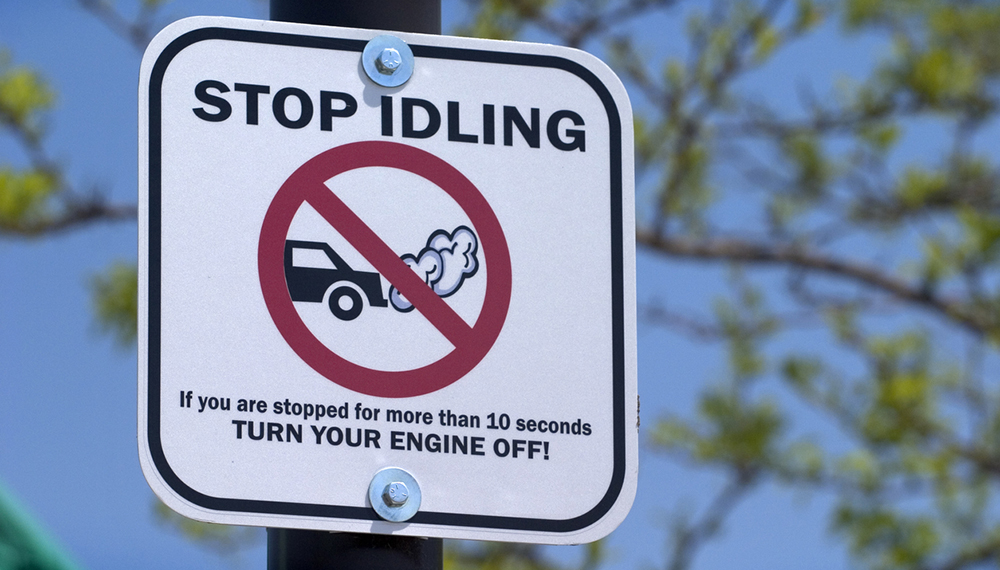Engine Idling – A Quick Way to Waste Money

Engine Idling
Wanna Save Some Cash – Turn Off Your Engine
Funny how people will search high and low for a screamin’ deal or a bargain, even braving the gauntlet of Black Friday at Walmart and then overlook one of the simplest money saving tactics available – turning off their engines instead of idling. And since this is California and not the frigid climes of Alaska, people aren’t idling to warm up their engines. They’re idling at the bank, the fast food restaurant, the driveway while chatting with the neighbor, in the supermarket parking lot with the air conditioning on full blast while talking to their mother on the phone, and of course, in gridlock traffic on the freeway. Idling is commonplace, and seemingly harmless, but besides costing you money that adds up over time, it impacts the longterm health of your engine, kicks out unnecessary exhaust into the atmosphere, and is also just plain and simply kind of wasteful.
The Cost of Idling on Your Engine
According to AAA regional manager James Spires, “If you average idling your vehicle for ten minutes a day (for) three… months you are simply increasing the wear and tear on your vehicle by eleven additional hours. You are also wasting an average of about 5.5 gallons of gasoline.” Idling a vehicle wastes between 1/4 to 1/2 gallon of fuel an hour. In a report published by the US Department of Energy on idling reduction for personal vehicles, “Researchers estimate that idling from heavy-duty and light-duty vehicles combined (in the US) wastes about 6 billion gallons of fuel annually.” According to Idle-Free California Inc, a 501c3 nonprofit organization based in Sacramento, “Studies conclude that about half of all idling occurs when parked (not in traffic). For California, it is estimated that idling when parked emits more than 3 million tons of carbon dioxide,(and) in the process consuming 330 million gallons of fuel.”
The Common Myth of Needing to Warm Up Your Engine
In a 2017 article in Popular Mechanics, author Jay Bennet states that, “The long-held notion that you should let your car idle in the cold is only true for carbureted engines. The common wisdom is that when you are gearing up to take your truck (or vehicle) out in the cold… you should step outside, start up your engine, and let it idle to warm up. But contrary to popular belief, this does not prolong the life of your engine; in fact, it decreases it by stripping oil away from the engine’s cylinders and pistons. Engines with electronic fuel injection have sensors that compensate for the cold by pumping more gasoline into the mixture. The engine continues to run rich in this way until it heats up to about 40 degrees Fahrenheit.” Idling with the AC on – a common occurrence in California to weather the extreme summer heat – may be detrimental to your engine if your radiator system is somehow compromised, potentially causing the engine to overheat.
The Cost of Engine Idling on Your Pocket Book
At an estimated 6 billion gallons of fuel wasted annually across the country as a result of engine idling, using California’s current fuel average of $3.73 per gallon ($0.85 above the national average), that equates to over $22 billion dollars of fuel used to cover approximately zero miles in distance. It is said that idling is “money out the tailpipe,” and this fuel waste can burn up a company’s bottom line needlessly. Besides the obvious loss of money from unnecessarily burned fuel while idling, the impact on an engine can also add up over time. In terms of engine wear, according to Idle Free California, “For every two minutes of idling, one mile could be traveled… (and these) ‘Ghost miles’ accumulate on an idling engine… (creating) engine wear and carbon soot buildup in the engine and components.” To offset these effects, many companies have installed engine idling and GPS tracking systems in their fleets of vehicles and trucks to make sure that drivers are not idling unnecessarily.
The Cost of Engine idling on the Environment
In California, regulations exist to mitigate the environmental effects of engine idling. The California Air Resources Board (CARB) states: “Emissions from on-road heavy-duty vehicles are major contributors to poor air quality in California. In particular, diesel vehicles produce emissions in amounts highly disproportionate to the total population of these vehicles. The problem is complicated by the large number of heavy-duty vehicles, like line haul trucks, registered in other states that travel on California’s highways and roads, while bringing goods and commerce into and out of our state. The Air Resources Board is working closely with the U.S. Environmental Protection Agency, engine and vehicle manufacturers, and other interested parties to address this issue and reduce heavy-duty vehicle emissions in California. Although this program targets both diesel-cycle and otto-cycle engines, more recent attention has been focused (specifically) on diesel engines.” Fines for idling in California are directed toward commercial vehicles, school buses, as well as heavy duty diesel owner/operators. In California, it is estimated that parked idling of all motor vehicles emit 3 million tons of CO2 annually. Within the state, the following cities maintain vehicle idling ordinances and policies that extend beyond Statewide regulations:
- Commerce
- Cupertino
- San Jose
- Santa Barbara
- Santa Cruz
In addition, an unknown number of municipalities have ordinances banning drive-thrus to reduce vehicle idling. The US Department of Energy has recognized as part of their ongoing studies in national idle reduction a list of states that adhere to idling restrictions. These states include Connecticut, Hawaii, Massachusetts, Maryland, New Hampshire, New Jersey, and Vermont for all vehicles and California, Delaware, Maine, Nevada, New York, Oregon, Pennsylvania, Rhode Island, South Carolina, Virginia and West Virginia for commercial diesel and/or all diesel vehicles. 12 additional states have jurisdictional idling regulations.
The Bottom Line
By understanding the financial and environmental impact of unnecessary engine idling you can make the choice to switch off your engine instead of burning expensive fuel and incurring extra wear and tear on your vehicle. As fuel prices continue to rise, every dollar counts. An easy cost savings remedy is to shut down your engine the next time you find yourself at the bank, the drive thru or even in your own driveway.
Contact an SCL Consultant Today
In a wide range of industrial sectors, SCL is committed to being the number one logistics and solutions provider for the products that protect and optimize the machines that keep our country moving. We pride ourselves on remaining at the forefront of industry trends and technological innovations, and as the market continues to evolve, we are committed to providing extensive product and industry knowledge and total performance satisfaction for our customers. For information on how we can assist your fleet in choosing the optimal products at a competitive price, contact an SCL consultant today.
